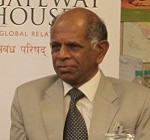In his book, ‘Diplomacy, Indian Style,’ Fabian writes that “according to Greek mythology, Athena came out of the head of Zeus, fully grown and fully armed. There is a popular notion that India’s foreign policy came out of Pandit Jawaharlal Nehru’s head in a similar fashion. That notion is wrong.”
K. P. Fabian, former Indian Ambassador to Italy, shares his insights with Gateway House’s Rajeshwari Krishnamurthy on how the formulation of India’s foreign policies depends on the written word over circumstances.
Q. A common theme that runs through your book, Diplomacy: Indian Style, is of India’s diplomacy as being textual rather than contextual. Could you expand on this concept? How is it reflected in our current foreign policy?
When decisions are made using the textual approach, the written or spoken word is given more value, whereas in the case of the contextual approach, decisions are made after analysing the situation holistically.
The Simla Agreement of 1972 is a classic example of Indian diplomacy’s textual approach. Indian Prime Minister Indira Gandhi assumed that Pakistani President Zulfikar Ali Bhutto would keep his word, despite the fact that all his promises were made only verbally.
If we analyse our current foreign policy, it is evident that India is keen on signing agreements with Pakistan. I believe that people-to-people interaction and trade with Pakistan should be carried out, but the belief that Pakistan, because of such measures, will cooperate to maintain peace and positive neighbourly relations by coming to an agreement on Kashmir, is a naive approach.
Over the years, Pakistan has repeatedly proved that it will not settle for anything short of the whole of Kashmir. India, despite having known this, looks to find a solution.
In terms of pragmatic politics, no government in New Delhi will survive if it makes huge concessions on Kashmir to Pakistan.
Q. You also state that Pakistan engaged in more nimble diplomacy to get the better of India in past encounters, such as the diplomacy following the Bangladesh Liberation War of 1971. Given the strategic space it should have won through this, how would you rationalise the current state of disorder, internal and external, that Pakistan is in today?
One can say Pakistan engaged in nimble diplomacy because it managed to have good relations with the U.S. and China despite these two countries being at odds with each other for decades.
Another instance of Pakistan’s diplomatic smartness is that it has progressed with a gas pipe line from Iran despite U.S. concerns in the matter.
Although India has a rightful claim over Kashmir, the Pakistani propaganda – that the Kashmir issue is an instance of liberation struggle – has been successful by and large.
But by not trying hard to keep normal, good neighbourly relations with India, Pakistan’s diplomacy has been a failure. Irrational hatred for India has resulted in Pakistan’s tolerating and encouraging terrorism; first against India, and then in Afghanistan. This is one of the core reasons for their deteriorating relations with the U.S., which now ‘drones’ them, despite being an ally.
Ambassador K. P. Fabian served in the Indian Foreign Service between 1964 and 2000, during which time he was posted to Madagascar, Austria, Iran, Sri Lanka, Canada, Finland, Qatar, and Italy. He is currently the President of AFPRO (Action For Food Production) and IGSSS (Indo-Global Social Service Society).
This interview was exclusively conducted for Gateway House: Indian Council on Global Relations. You can read more exclusive content here.
For interview requests with the author, or for permission to republish, please contact outreach@gatewayhouse.in.
© Copyright 2012 Gateway House: Indian Council on Global Relations. All rights reserved. Any unauthorized copying or reproduction is strictly prohibited.


